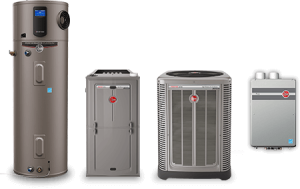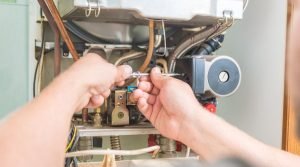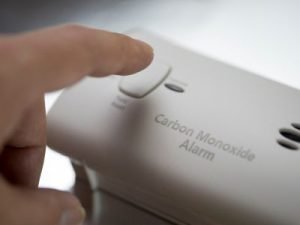A reliable furnace is a must-have for surviving a Colorado Springs winter. When the temperature drops and your furnace falters, you might consider the DIY approach to save some cash. However, the intricacies of furnace systems and the potential safety hazards make professional service a smart choice. This post breaks down the different furnace types, common repairs, associated costs, and the pros and cons of DIY versus professional service in Colorado Springs.
Types of Furnaces in Colorado Springs

Colorado Springs homes commonly use these furnace types:
- Gas Furnaces: The most popular, using natural gas for heating.
- Electric Furnaces: These use electricity to heat coils and warm the air.
- Boilers: These heat homes with hot water or steam, circulated through radiators or radiant floors.
- Heat Pumps: These systems both heat and cool by transferring heat.
Each type has its own maintenance and repair needs. Knowing your system is key.
Common Furnace Repairs and Maintenance in Colorado Springs

Colorado Springs winters are tough on furnaces, leading to issues like:
- Filter Replacement: Regular filter changes are vital for airflow and efficiency.
- Burner and Flame Sensor Cleaning: Dirty components can cause ignition problems and reduce efficiency.
- Blower Motor and Fan Inspection and Cleaning: This ensures proper airflow and prevents overheating.
- Electrical Connection Checks and Tightening: Loose connections can disrupt operation and create safety hazards.
- Heat Exchanger Inspection: Cracks can lead to dangerous carbon monoxide leaks.
- Blower Motor Bearing Lubrication: This often requires specialized knowledge, best left to professionals.
- Flue Pipe Leak Checks: Leaks can release harmful combustion byproducts.
- Carbon Monoxide Detector Installation: Essential for safety, a professional should inspect it annually.
Regular maintenance extends a furnace’s typical 15-20 year lifespan and prevents costly repairs.
Average Cost of Furnace Repair and Maintenance in Colorado Springs

Costs depend on the problem and the service provider. Here’s a general idea:
| Service | Average Cost | Notes |
|---|---|---|
| Furnace Repair | $129 – $1,119 | May include diagnostic fee. Extra charges may apply for after-hours service. |
| Furnace Maintenance | $129 – $179 | |
| Furnace Replacement | $1,434 – $1,580 | Furnace cost averages $1,004, labor around $279. Permits may add $50-$150. |
DIY vs. Professional: Pros and Cons
DIY offers potential cost savings, but expertise and safety are vital.
| Feature | DIY Furnace Repair | Professional Furnace Repair |
|---|---|---|
| Cost | * Savings on service calls and labor. | * Labor charges and potential diagnostic fees. Long-term savings possible with high-efficiency systems. |
| Convenience | * Flexible scheduling. | * Requires scheduling and waiting for a technician. |
| Expertise | * Risk of worsening problems and higher costs due to lack of specialized knowledge. | * Trained and experienced technicians accurately diagnose and resolve issues. |
| Safety | * Risk of handling gas lines, electricity, and combustion byproducts without proper training. | * Technicians follow safety protocols. |
| Warranty | * DIY repairs can void warranties. | * Professional repairs often covered by warranties. |
| Tools & Equipment | * May lack specialized tools. | * Professionals have necessary tools and equipment. |
| Other | * Sense of accomplishment. | * Saves time and hassle. |
DIY Furnace Repair and Maintenance Tips

If you DIY basic maintenance:
- Always turn off power first.
- Change filters regularly (every three months).
- Clean the area around the furnace.
- For oil furnaces, clean the combustion chamber regularly.
- Check and relight the pilot light (if applicable).
- Inspect and clean the blower fan.
- Check belts for wear and adjust tension.
- Ensure vents are open and unobstructed.
- Check thermostat settings and batteries.
- Consult the furnace manual.
Important: Keep DIY to basic tasks. Complex repairs involving gas lines, electrical wiring, or the heat exchanger should be handled by professionals.
Signs You Need Furnace Repair
Watch for these red flags:

- Rising utility bills.
- Strange smells or carbon monoxide worries.
- Unusual noises or vibrations.
- Frequent cycling or failure to turn on.
- Uneven heating.
If you notice any of these, contact a professional.
Conclusion
A functioning furnace is essential in Colorado Springs. DIY can save money, but weigh the risks. For complex jobs, professional help is key. Regular maintenance, whether DIY or professional, extends furnace life and prevents expensive repairs. The decision depends on your skills and the issue’s complexity. Prioritize regular upkeep and expert help when needed for a warm, safe home.
For all your furnace needs in Colorado Springs, call the professionals at Elevation Mechanical today!



